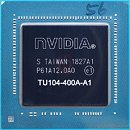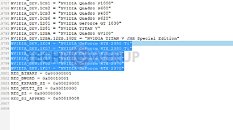Raevenlord
News Editor
- Joined
- Aug 12, 2016
- Messages
- 3,755 (1.22/day)
- Location
- Portugal
| System Name | The Ryzening |
|---|---|
| Processor | AMD Ryzen 9 5900X |
| Motherboard | MSI X570 MAG TOMAHAWK |
| Cooling | Lian Li Galahad 360mm AIO |
| Memory | 32 GB G.Skill Trident Z F4-3733 (4x 8 GB) |
| Video Card(s) | Gigabyte RTX 3070 Ti |
| Storage | Boot: Transcend MTE220S 2TB, Kintson A2000 1TB, Seagate Firewolf Pro 14 TB |
| Display(s) | Acer Nitro VG270UP (1440p 144 Hz IPS) |
| Case | Lian Li O11DX Dynamic White |
| Audio Device(s) | iFi Audio Zen DAC |
| Power Supply | Seasonic Focus+ 750 W |
| Mouse | Cooler Master Masterkeys Lite L |
| Keyboard | Cooler Master Masterkeys Lite L |
| Software | Windows 10 x64 |
A report from Tom's Hardware.de claims that multiple industry sources have confirmed that NVIDIA will stop offering higher-binned, differentiated A-dies of their Turing silicon. If you'll remember, the company introduced specific A-binned chips for AIB partners to ship with factory overclocks to customers, due to their higher overclockability - and likely, better power consumption profile - when compared to non A-binned dies. This practice was reserved to the company's best, though, in the form of the TU104-400A-A1 die (compared to the TU104-400-A1 dies used in non-overclocked versions of AIB graphics cards). The company is now seemingly killing this practice by offering a one-off Turing die with no such limitations.
This move by NVIDIA - on which we reported firsthand here at TPU - was likely a solution to somewhat less than ideal yields for its TU-104 chips, ensuring partners could provide the best experience to users who were willing to pay the most. The fact of the matter is that AIB partners were locked out of overclocking non-A dies should they acquire them (which were going for less than their higher-binned A-cousins), though the end-user would not see such a limitation - besides the one imposed by the expectedly less capable dies present on those non factory-OC'd cards.


View at TechPowerUp Main Site
This move by NVIDIA - on which we reported firsthand here at TPU - was likely a solution to somewhat less than ideal yields for its TU-104 chips, ensuring partners could provide the best experience to users who were willing to pay the most. The fact of the matter is that AIB partners were locked out of overclocking non-A dies should they acquire them (which were going for less than their higher-binned A-cousins), though the end-user would not see such a limitation - besides the one imposed by the expectedly less capable dies present on those non factory-OC'd cards.


View at TechPowerUp Main Site






